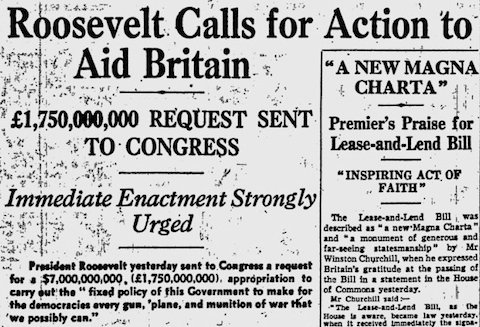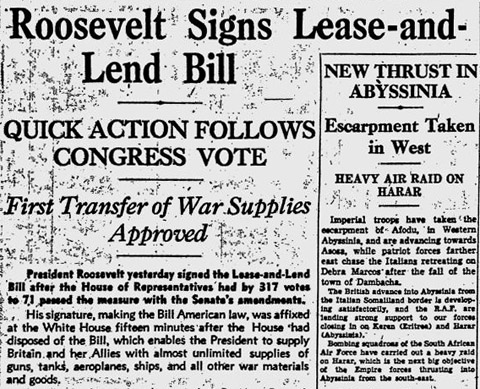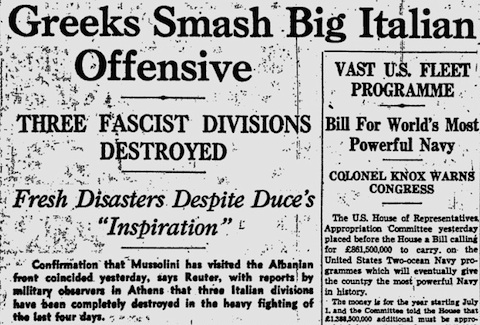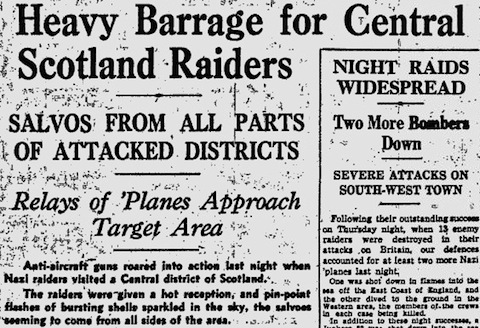
The Glasgow Herald today again leads with Lease-and-Lend, specifically the massive appropriation request made by Roosevelt to Congress — over half a billion pounds’ worth of ‘aircraft and aeronautical material, including engines, spares, and accessories’ alone (5). The Bill will be ready for debate early next week: the Speak of the House of Representatives, Sam Rayburn, promised ‘We are going to put everything else aside’.
Of course, the passing of Lease-and-Lend was welcomed here in Britain. Churchill, with a degree of historical inexactitude, likened it to the Magna Carta. His speech was ‘spoken with that artistic perfection which we have come to expect from our national leader’ (4), in the opinion of the Herald‘s political correspondent. However, there is a hint of unease too:
It is fully realised in official circles that the United States’s decision may drive Hitler soon to make his supreme effort in the war before the guaranteed help can reach us. Developments in that sense are expected without the elapse of a long interval.
And it may ‘be made through the Balkans’. Here Greece (with some British assistance in the form of the RAF) is still holding firm against the Italian attack from Albania (even though Mussolini is currently there directing operations). Now comes news that Germany is placing ‘extremely heavy’ (5) diplomatic pressure upon Yugoslavia, with a ‘new German Note’ calling for
active assistance for the Axis should Yugoslavia desire the place reserved for her in the “New Order” in Europe.
Still, there seems to be general confidence in Britain’s position in the Balkans. The offensive into Italian-held Abyssinia is also going well, with the ‘British force’ from Somaliland advancing 120 miles in the last 48 hours. It’s now 600 miles from Mogadishu, and has inflicted 31,000 casualties upon the Italian defenders.
Let’s have some air war news. A German air raid on London last night was met by ‘a terrific anti-aircraft barrage’:
The thunderous rumble seemed to indicate yet another development in the ground defences. Nothing like it has been heard before in the raids on this country.
No speculation is offered as to what this new anti-aircraft weapon might be, however. Raiders were also active over the north of Scotland: ‘bombs were dropped’, no indication of any damage given. On the other side of the equation, on Tuesday night Kiel was raided by Bomber Command for the thirty-third time. The Air Ministry reported (6):
The flashes of heavy explosions and the glare of a large fire were observed. The docks at Bremerhaven and two aerodromes in North-West Germany were also bombed.
In daylight on Tuesday single aircraft of the Bomber Command bombed an oil storage plane at Rotterdam and a factory near Utrecht.
No aircraft were lost on any of these operations.
Reid’s third article on peace aims looks at a couple of ideas. The first is that Britain should try to encourage revolution in Nazi-occupied Europe (4):
If we are to break the power of Nazi Germany, runs this argument, we must have the active support of the oppressed nations of Europe as well as of the remaining neutrals. We can never have a British Army as large as Hitler’s. The only way to redress the balance is to create at the right moment an immense Continental revolt.
His main objection to this is that it seems unlikely that the conquered peoples of Europe are looking forward to a new order, but instead are looking back to the old one, a restoration of the liberties which Germany took from them.
If our propaganda lays its main stress on “revolution” it will certainly discourage those among our conquered Allies who are not in a revolutionary frame of mind, or do not share British Leftist ideas of what a desirable revolution would be.
Reid seems unable to conceive of a popular revolution as being anything other than Bolshevist. Is it not possible that people would rise up to reclaim their lost freedoms instead of for a communist state?
The second idea Reid deals with is the ‘vision of a Pax Britannica (or Anglo-Saxonica)’, where Britain and the United States would combine their military strength to keep the peace. This has the virtue of precedent in the century of relative peace from 1815 to 1914. But Reid argues that the world has changed since then, when Britain had a monopoly on industrial as well as naval power:
Even Britain and the United States combined have no such monopoly now. And we cannot feel at all certain that if the “Anglo-Saxon Powers” were deliberately to set themselves to dominate the world — for its good as well as their own — other countries would not, sooner or later, combine to revolt against that domination.
There is a brief obituary on page 7 of F. Britten Austin, author of (among other things) The War-God Walks Again (1926). He began writing in 1911 but joined the Army in 1914, serving in France and demobilising with the rank of captain.
Mr Austin was a military expert who foresaw with remarkable accuracy great battles between mechanised armies before the tank was invented.
He died yesterday, aged 55.
![]() This work is licensed under a Creative Commons Attribution-NonCommercial-NoDerivatives 4.0 International License.
Permissions beyond the scope of this license may be available at http://airminded.org/copyright/.
This work is licensed under a Creative Commons Attribution-NonCommercial-NoDerivatives 4.0 International License.
Permissions beyond the scope of this license may be available at http://airminded.org/copyright/.



